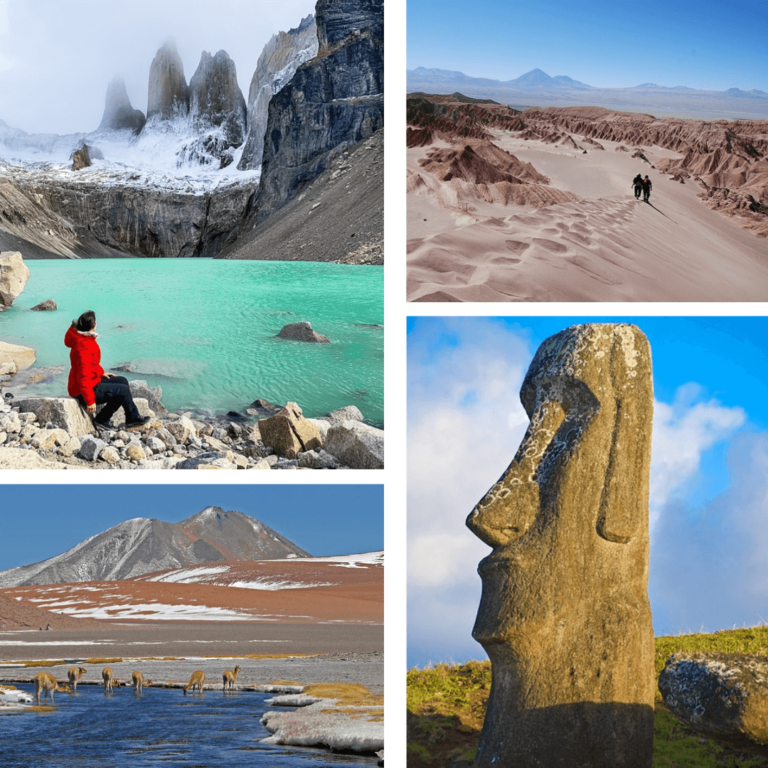Medical insurance for Chile: The best options for expats
After reading this guide, it will be easier for you to choose the most suitable medical insurance for travel to Chile!
Chile is one of the best places to live in South America. There are plenty of reasons why: a stable economy, modern cities—especially Santiago, the capital—an incredible number of national parks where you can truly connect with nature, delicious food, and so much more. If you’re thinking about moving there, get ready for lots of pleasant surprises. But to make sure your experience goes smoothly, there are a few things you’ll want to plan ahead for—like getting medical insurance. Imagine getting injured while hiking through Torres del Paine, or feeling sick at over 3,000 meters in the Atacama Desert. If you have medical insurance for travel to Chile, those kinds of setbacks won’t ruin your trip—and you’ll be able to keep enjoying everything the country has to offer.
In other words, having coverage for any illness, medical issue, or accident that might happen while you’re living in Chile will give you peace of mind as you explore the country. Today, we’re here to help you find the best health insurance for travel to Chile. We’ve looked into different options and broken down what each one offers—the pros, the cons, and everything in between. Let’s dive in!
5 reasons to purchase medical insurance for travel to Chile
One of the standout features of Chile’s healthcare system is its quality. The country has modern hospitals, top-tier private clinics, and a network of highly trained medical professionals. So, if something unexpected happens, you can feel confident you’ll be in good hands. That said, it’s important to keep in mind that healthcare in Chile can be expensive. Without insurance, even a routine visit could leave you with a hefty bill.
Not convinced yet? Take note of these 5 reasons why having medical insurance to travel to Chile is not only important, but also necessary:
- 1- High medical costs: Chile’s healthcare system includes both a public option (FONASA) and a private one (ISAPRES). Both offer good-quality care, but private healthcare can get pretty pricey. For instance, a basic doctor’s appointment might cost anywhere from $60 to $100, and a single night in the hospital can run you over $1,000. Now imagine having to dip into your travel fund—money you’d set aside for a trip to the Marble Caves—just to cover a medical bill. Not ideal, right?
- 2- Quick access to specialists: Having health insurance gives you faster access to specialists and advanced medical services. Without it, if you rely solely on the public system, you could be waiting days—or even months—for an appointment. For something like a routine gynecological checkup, a long wait might not be a big deal. But in a real medical emergency—say, needing an appendectomy—having insurance can make a huge difference in how quickly you’re treated and the overall quality of care you receive.
- 3- Coverage in adventure activities: Chile’s wild, diverse terrain is a playground for adventure lovers. Whether you’re hiking through the epic trails of Torres del Paine, skiing in Valle Nevado, or surfing the waves in Pichilemu, there’s no shortage of ways to get your adrenaline fix. But with adventure comes risk. The upside? A lot of international health insurance plans include coverage for injuries related to outdoor and extreme sports. So if you’re the type who likes to chase thrills, make sure your insurance has your back out there.
- 4- Serious emergencies or repatriation: If you face a serious illness that requires long-term treatment at a specialized clinic—or an accident that forces you to return home—international health insurance can be a lifesaver. This kind of coverage is especially important, since paying for those services out of pocket can be extremely expensive.
- 5- Visa requirements: While medical insurance isn’t required to enter Chile as a tourist, if you’re planning to stay longer, work, or study there, you’ll likely need to show proof of coverage when applying for a visa.
As you can see, taking out medical insurance for travel to Chile will not only give you and your family peace of mind, but will also help you make the most of your travel experience in this South American country.

Which foreigners need medical insurance to travel to Chile?
No matter what brings you to Chile, having medical insurance means you’ll have access to quality medical care without the stress of high costs. Whether you’re just here to explore the country’s natural wonders or planning to settle down for the long haul, investing in a good health insurance plan will give you peace of mind if something unexpected comes up.
To answer the question, these are the types of foreigners who need medical insurance to travel to Chile:
1. Tourists
Chile is a country that welcomes tourists from all over the world, and you can see that for yourself simply by walking the dusty streets of San Pedro de Atacama or strolling through the vibrant city of Santiago. Wherever you go, you’re bound to come across visitors who are in awe of the beauty of this country, nestled between the Andes mountains.
If you’re planning to visit Chile for a short period, you’ll need medical insurance to cover any unexpected health issues. Remember, private healthcare costs can be quite high. Additionally, in some cases, the authorities may require proof of insurance as a condition for entry, especially for travelers coming from countries with visa agreements.
2. Digital nomads and remote workers
Digital nomads and remote workers have the freedom to roam and work from almost anywhere in the world. In this regard, Chile stands out as one of the most attractive destinations in South America, thanks to its economic stability, excellent internet connectivity, and high quality of life.
If you fall into this category, having medical insurance will benefit you, especially if you plan to stay in Chile for an extended period. Since people in this group typically aren’t enrolled in the local healthcare system, having either international or local health insurance is crucial to ensure access to private clinics and hospitals, which are highly recommended for their fast service and high-quality care.
3. International students
It’s not just digital nomads and remote workers who are drawn to Chile, but also international students looking for exchange programs, undergraduate or graduate studies, or specialized courses. In these cases, medical insurance is not only essential but often mandatory, as many educational institutions require proof of coverage as part of the admission process.
International student health insurance should cover emergencies, hospitalizations, and basic medical check-ups. Additionally, some plans include coverage for medications, psychological treatments, or accidents related to extracurricular activities. So, if you’re planning to study in Chile, make sure to get medical insurance!
4. Expats and foreign workers
Expats moving to Chile for work also need health insurance, especially if their employer doesn’t automatically register them in the local healthcare system. Although most companies offer health coverage as part of their employee benefits, many expats prefer to get additional international insurance that covers them in Chile and other countries as well. This is especially crucial for those with families who need medical coverage too.
Important: If you are a frequent traveler and want to stay connected without worrying about expensive roaming or looking for a new SIM at every destination, Holafly’s subscription plans are for you. With a single eSIM, enjoy internet in more than 170 countries for a fixed price and no surprises on your bill. Travel without limits and connect easily and securely! 🚀🌍

5. Business travelers
Not everyone who comes to Chile from abroad is here to study, work, or travel. Let’s not forget that Santiago is a major business hub, so thousands of professionals visit the country for work-related reasons, whether it’s for meetings, conferences, or other events. Even if it’s just a short stay, having health insurance is still recommended, as medical emergencies don’t wait for the right moment. In these cases, you can opt for a temporary plan or an international insurance that provides quick and effective coverage in case of unexpected situations.
6. Sportsmen and adventurers
As you probably know, Chile is a paradise for extreme sports and adventure enthusiasts. Whether it’s rafting on the Futaleufú River (one of the best in the world), rock climbing or rappelling in the Cochamó Valley, diving in Easter Island, paragliding in Iquique, or skiing in the Andes, the possibilities are endless. In these situations, you’ll definitely want to have medical insurance that covers you in case of an accident. Keep in mind that this coverage is especially important in remote areas, where rescue operations and medical transport can be very expensive.
7. Foreign retirees
On the flip side, there are retirees who plan to enjoy their golden years on a beach in central or northern Chile, or in a cabin by a Patagonian lake. The country’s diverse climate, high quality of life, and relatively low cost compared to other countries make it especially appealing. For this group, having medical insurance is also essential, as their age may bring an increased need for medical care.
Many insurers offer plans designed specifically for seniors, which include coverage for pre-existing conditions, regular check-ups and medications.
8. Temporary or permanent migrants
Foreigners looking to settle in Chile, whether temporarily or permanently, also need medical insurance, especially during the time it takes to join the local healthcare system. This is crucial to ensure they have access to medical services while they sort out their immigration status or find employment.

What type of medical insurance for travel to Chile is suitable for foreigners?
Foreigners living in Chile (whether digital nomads, remote workers, students, retirees, expats, etc.) can choose from various types of health insurance based on the nature of their stay, their budget, and their coverage needs. Each of the options we’ll outline below is designed to ensure that both residents and foreigners receive the appropriate medical care during their time in the country.
Let’s see which type of medical insurance for travel to Chile best suits your situation:
1. International health insurance
This type of insurance is perfect for those who travel often or want coverage worldwide, including outside of Chile. With international travel insurance, you’ll be protected not only in Chile but also in other countries. Top providers in this field include Allianz Care, Cigna Global, and Aetna International, offering plans that cover medical emergencies, hospital stays, repatriation, and basic care.
2. Local health insurance
Local health insurance is ideal for those living in Chile, whether temporarily or permanently. These plans typically cover doctor visits, prescription medications, hospitalizations, and other basic services within the country, while offering a wide selection of affiliated clinics and hospitals. Some of the most well-known providers include Cruz Blanca, Colmena, and Consalud, with plans tailored to meet the needs of foreign residents.
3. Temporary health insurance
If you’re only staying in Chile for a short period, like a couple of weeks, a temporary health insurance plan might be the right choice. These plans offer more limited coverage, focusing on emergencies, specific illnesses, and sometimes minor accidents. While the coverage is basic, it’s a good option for those looking to avoid pricier plans. One popular option for this type of coverage is Assist Card, which provides services tailored to travelers seeking peace of mind during their trip.
How much do health services cost in Chile?
When you see the cost of healthcare services, you’ll quickly realize that having travel health insurance for your time in Chile is a smart choice. While public healthcare is available to everyone, it often involves long wait times, particularly for complex tests or specialist consultations. Plus, public hospitals can sometimes face delays due to a lack of beds and staff. In contrast, private healthcare offers faster access to specialists and better facilities, but of course, it comes with a price. So let’s take a look at how this works in Chile:
Approximate costs of medical services in 2025 (in US$)
| Medical Services | Approximate Cost |
| General medical consultation | 60 – 100 |
| Consultation with specialist | 80-200 |
| Hospitalization per day | 1,000 – 2,000 |
| X-ray | 40 – 70 |
| Complete blood test | 30 – 50 |
| Emergency care | 150 – 300 |
| Physical therapy per session | 40 – 80 |
While costs may not be as high as in other countries, they can still be quite impactful, especially when it comes to things like hospitalization or more complex medical procedures. On the other hand, you can get good coverage for about $160 a month without having to pay extra when you receive care.
Medical insurance for travel to Chile: which one to buy?
Choosing medical insurance for your trip to Chile can be tricky, as there are many options, and they’re all generally very good. To help you with the decision, we’ve selected five top options (three international and two local) and reviewed their plans, costs, pros, and cons. By the end, you’ll have a clearer understanding of what each one offers and be able to make the best choice based on your needs. That said, in the next section, we’ll share what we believe is the best medical insurance for traveling to Chile.

1. Allianz Care: The best medical insurance for travel to Chile
Allianz Care is a division of Allianz Partners, specializing in international health insurance, so you’ll be covered both within Chile and abroad. Their plans are designed for individuals, families, and businesses living or working outside their home country and include:
- Inpatient and outpatient care.
- Coverage for chronic and pre-existing illnesses (depending on the plan).
- Medical evacuation and repatriation.
- Wellness services and expatriate assistance programs.
The plans are flexible, so you can tailor your coverage to suit your needs. For example, if you have a pre-existing condition like diabetes or hypertension, you’ll want to choose a plan that covers those. However, if you’re just planning to spend a couple of weeks traveling around the country in a motorhome, you might prefer a more basic plan that still offers solid coverage for accidents.
Prices vary depending on factors like age, coverage level, and any additional benefits you choose. For example, a basic plan for a young adult might cost around $150 per month. A more comprehensive plan could exceed $300 per month.
| Advantages | Disadvantages |
| Global coverage, ideal for frequent travelers. | Higher costs compared to local insurers. |
| Access to a broad network of quality medical providers. | Some exclusions and waiting periods for certain medical conditions. |
| Digital services such as the MyHealth app to manage reimbursements and access policy information. |
2. Cigna Global
Another great option for medical insurance when traveling to Chile is Cigna Global. This renowned international insurer has years of experience providing health insurance for expats and frequent travelers, offering flexible and customizable plans. This type of coverage is perfect for digital nomads or remote workers who want the freedom to move around the region and explore neighboring countries while staying covered.
Cigna Global plans are similar to Allianz Care and include:
- Inpatient and outpatient care.
- Coverage for chronic and pre-existing conditions (subject to assessment).
- Emergency medical evacuation.
- Additional options such as dental and maternity care.
The prices of their plans depend on the level of coverage: Silver, Gold, and Platinum. For the most basic option, the Silver plan, prices can start around $120 per month. While a Platinum plan with additional coverage can exceed $300 per month.
| Advantages | Disadvantages |
| Flexibility to customize coverage to individual needs. | Like Allianz Care, its costs are higher compared to local insurance. |
| Access to a broad network of medical providers worldwide. | Some exclusions and waiting periods for certain coverages. |
| Digital tools to manage the policy and access wellness services. |
3. Assist Card
Assist Card is a global company that specializes in providing complete travel assistance, including health insurance. Established in 1972, it has become a market leader, offering services in over 190 countries and ensuring round-the-clock coverage every day of the year.
Assist Card plans are designed to take care of various contingencies that may arise during a trip, including:
- Medical assistance due to illness or accident.
- Emergency dental care (some plans).
- Medical transfer and/or repatriation.
- Coverage for pre-existing conditions.
| Advantages | Disadvantages |
| Global coverage | Additional costs for some services or coverages |
| 24/7 assistance in all languages | Exclusions and limitations |
| Variety of plans to suit all types of needs and budgets | Higher prices compared to local plans |
| Additional services |
4. Cruz Blanca
Cruz Blanca is one of the leading health providers in Chile, offering health plans for both residents and foreigners in the country. It is part of Bupa, an international group that is a global leader in health insurance.
Cruz Blanca plans include:
- Inpatient and outpatient care in a network of affiliated clinics and hospitals.
- Coverage for medical consultations, tests and procedures.
- Plan options with preferred coverage at certain medical institutions.
Their plans differ based on the level of coverage and the network of providers. Prices are influenced by factors like age, gender, and income. For instance, a basic plan for a young adult may start at around $70 per month. While their rates are more affordable than international insurance, the coverage is restricted to Chile. So, if you plan to travel abroad, you’d need to look into other options.
| Advantages | Disadvantages |
| Access to a wide network of health care providers in Chile. | Coverage limited to Chilean territory. |
| Plans adapted to the local health system, facilitating medical care. | Some plans may have high co-payments or restrictions on certain services. |
| Plan options with preferred coverage in high quality clinics. |
5. Colmena
Colmena provides health insurance plans for individuals and families, including foreign residents in Chile, offering coverage throughout the country. Like Cruz Blanca, it has a broad network of affiliated clinics and hospitals, though it’s more concentrated in specific metropolitan areas. Their plans include:
- Inpatient and outpatient care.
- Coverage for medical consultations, examinations, hospitalizations and procedures.
- Access to a network of preferred providers with additional benefits.
Colmena offers a range of plans to suit different needs and budgets. For example, a basic plan for a young adult might start at around $75 per month, which is quite similar to what Cruz Blanca offers.
| Advantages | Disadvantages |
| Wide network of health care providers throughout Chile. | Coverage is limited to Chile, so if you leave the country you will no longer be covered. |
| Plans with additional benefits such as dental or drug coverage. | Some plans may have restrictions on the choice of providers or services. |
| Customer service and online services to facilitate policy management. |
What is the best medical insurance for travel to Chile?
Among all the international and local insurance options mentioned earlier, we’ve chosen Allianz Care as the best choice for foreigners planning to travel to Chile. While it shares similarities with Assist Card, Cigna Global, and other global insurers, it stands out in certain areas that make it our top pick.
- Extensive international medical coverage. Allianz Care plans include both inpatient and outpatient care, coverage for chronic and pre-existing conditions (depending on the plan), medical evacuation and repatriation, wellness services, and expatriate assistance programs. Their network of healthcare providers is exceptionally broad, making it easy to access medical care both within Chile and abroad.
- 24/7 assistance. Another key benefit is their 24/7 multilingual support. This is important because, in case of any issues or questions about your policy, you’ll be able to get assistance in your language.
- Flexibility in plans. The plans are flexible, allowing you to tailor coverage to your needs, with added options like dental care, maternity services, and repatriation.
- Digital tools. In today’s world, having digital tools to streamline paperwork is essential. In this regard, Allianz Care offers its members a mobile app called MyHealth, which makes managing reimbursements, accessing policy details, and other health-related services easier, enhancing the overall user experience.
- Excellent value for money. Finally, Allianz Care stands out for its balance of coverage, price, and additional services, making it a reliable option for those looking to travel to Chile with peace of mind and security.
Choosing the right medical insurance for traveling to Chile depends on various factors, but if you’re after extensive international coverage, Allianz Care is a great choice. However, if you’d rather go for a local plan that covers you within the country, both Colmena and Cruz Blanca offer similar options at competitive rates.
Frequently asked questions about medical insurance for travel to Chile
An international health insurance plan covers medical emergencies and basic services in multiple countries, making it ideal for frequent travelers. On the other hand, a local insurance plan is meant for residents and only covers medical services within Chile. For short stays, international insurance is usually the more convenient option.
The public healthcare system in Chile (Fonasa) is not available to tourists. Though some international health insurance plans have arrangements with public hospitals and clinics for emergency care. However, most foreigners opt for private clinics, as they generally offer faster service and higher-quality care.
Some insurers, like Allianz Care and Assist Card, offer plans that include coverage for adventure sports, such as skiing in the Andes or trekking in Torres del Paine. However, make sure to check the terms and conditions of the insurance before signing up. Not all plans cover these types of activities.
The cost of health insurance depends on factors such as the duration of the trip, the coverage, and the age of the insured. For example, basic plans can range from $20 to $50 per week, while more comprehensive plans with global coverage can exceed $100 per week.
While it’s not mandatory to have medical insurance to enter Chile, it’s highly recommended. Medical costs in the country can be high, especially in private hospitals, and having insurance can cover emergencies, hospitalizations, and repatriations, providing peace of mind during your trip.
The ideal medical insurance should cover medical emergencies, hospitalization, outpatient care, medications, medical repatriation, and, if possible, coverage for adventure sports if you plan on activities like hiking or skiing.





 Language
Language 


















 No results found
No results found



